Studying medicine in Egypt offers an intriguing blend of ancient cultural heritage and modern medical practices. Egyptian medical schools, such as Cairo University Faculty of Medicine, provide quality education with an emphasis on both theoretical knowledge and practical skills. Courses are often taught in English, attracting international students. Affordable cost of education is making Egypt an attractive option for international students seeking a reputable & best medical education.

Egypt, a country in northeastern Africa, is renowned for its ancient civilization, with a rich history spanning millennia. Home to iconic monuments such as the Great Pyramids of Giza, the Sphinx, and Luxor's Karnak Temple, Egypt captivates with its archaeological wonders. The Nile River, the longest in the world, has been the lifeblood of Egyptian civilization, facilitating agriculture and trade since antiquity. Modern Egypt is a vibrant mix of ancient traditions and contemporary influences, with bustling cities like Cairo blending with tranquil oases and picturesque coastal resorts along the Red Sea. Egyptian culture is celebrated worldwide for its music, dance, cuisine, and distinctive artistry. Egypt continues to attract millions of visitors annually, drawn by its unparalleled historical legacy, stunning landscapes, and enduring mystique.

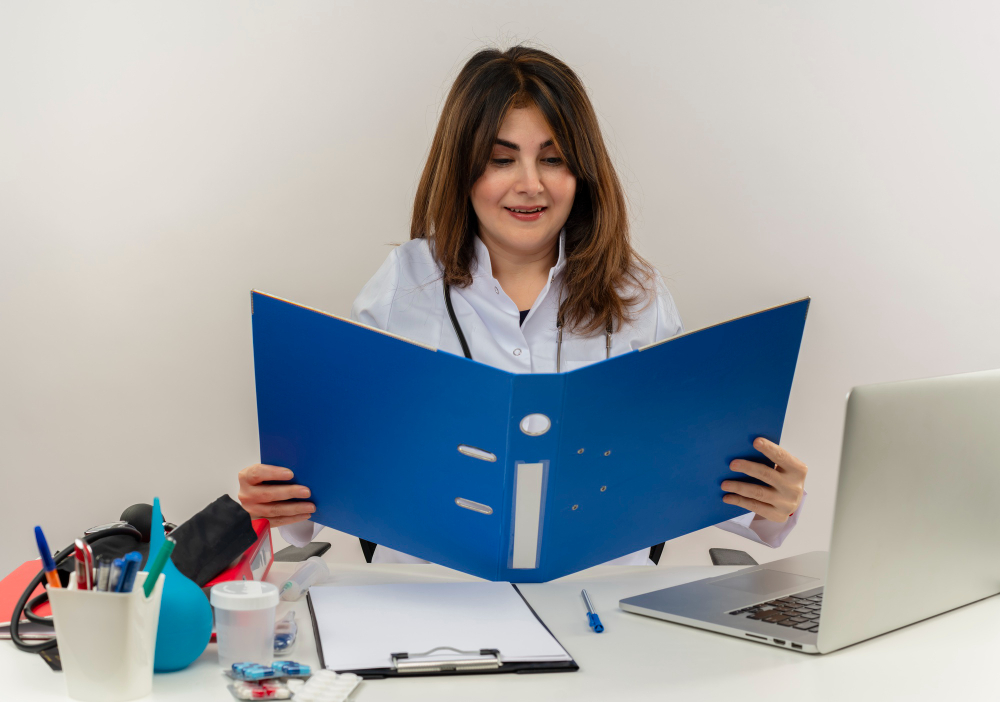
| Intake | June – October & Jan – Feb |
|---|---|
| Score Required in 10+2 | 60% - 75% in PCB |
| NEET Requirement | Yes, NEET Qualified |
| Fees Structure | 5000 – 7000 USD Per Year |
| Hostel & Mess | 150 to 250 USD Per Month |
| Duration | 5+1 Years (Including Internship) |
| Medium of Instruction | English |
| Top Medical University | Cairo University |
| Recognition | WHO, WFME, ECFMG, NMC, FAIMER, MINISTRY OF EDUCATION, EGYPT |
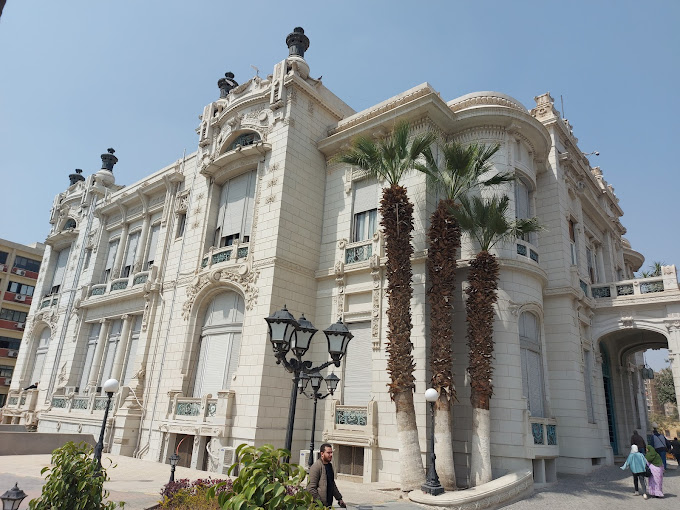
Ain Shams University, particularly its Faculty of Medicine, stands as a bastion of medical education and healthcare provision in Egypt and the wider Middle East. Founded in 1950, Ain Shams University has evolved into one of Egypt's premier institutions, renowned for its academic excellence, research contributions, and commitment to serving society's healthcare needs.
The Faculty of Medicine at Ain Shams University represents the cornerstone of the institution's medical education and training. With a rich history spanning over seven decades, the faculty has continuously adapted to meet the evolving demands of medical practice and education.
The journey of medical education at Ain Shams begins with a rigorous selection process, where aspiring students compete for admission into the esteemed faculty. Once admitted, students embark on a transformative journey, guided by a distinguished faculty comprising seasoned clinicians, researchers, and educators. It offers Undergraduate Degree of MBBS - The usual and most common degree offered by medical schools in Egypt & Postgraduate Degree programme-The Faculty offers masters and doctorate degrees.
The curriculum at Ain Shams University's Faculty of Medicine is designed to provide students with a comprehensive understanding of medical science, clinical skills, and professional ethics. From the foundational principles of anatomy, physiology, and biochemistry to the intricacies of pathology, pharmacology, and clinical medicine, students are exposed to a diverse array of disciplines essential for their development as competent physicians.
Practical training is a central component of the medical curriculum at Ain Shams University. Under the supervision of experienced preceptors, students gain hands-on experience in clinical settings, honing their diagnostic and therapeutic skills while cultivating empathy and professionalism in their 3430 bed ultra-modern hospital.
Research is ingrained in the fabric of Ain Shams University's medical education. Faculty members and students alike actively engage in research endeavours spanning basic science, translational research, and clinical investigations. Through research initiatives, students develop critical thinking skills, contribute to scientific knowledge, and explore innovative solutions to healthcare challenges.
Ain Shams University's Faculty of Medicine is committed to fostering a culture of academic excellence and lifelong learning. Continuing medical education programs provide practicing physicians with opportunities to enhance their knowledge and skills, staying abreast of the latest advancements in medical science and technology.
The faculty's commitment to excellence extends beyond the confines of the university campus. Community outreach programs and healthcare initiatives serve marginalized populations, addressing their healthcare needs and promoting health equity across Egypt.
In addition to its academic and clinical pursuits, Ain Shams University's Faculty of Medicine is actively engaged in international collaboration and exchange. Partnerships with renowned institutions worldwide facilitate knowledge sharing, research collaboration, and cultural exchange, enriching the educational experience for students and faculty alike.
As Egypt's healthcare landscape continues to evolve, Ain Shams University's Faculty of Medicine remains at the forefront of innovation and excellence. Through its unwavering commitment to education, research, and service, the faculty continues to produce generations of compassionate physicians dedicated to improving the health and well-being of communities at home and abroad.
Ain Shams University's Faculty of Medicine stands as a beacon of excellence in medical education, research, and healthcare provision. With a legacy spanning over seven decades, the faculty continues to uphold its commitment to academic excellence, professional integrity, and societal responsibility, shaping the future of healthcare in Egypt and beyond.

Cairo University – Faculty of Medicine stands as a beacon of medical education and research excellence within Egypt and the broader Middle East region. Founded on principles of innovation, academic rigor, and a commitment to societal health, has emerged as a premier institution shaping the future of medicine and healthcare delivery.
The origins of the Medical University of Cairo can be traced back to the early 20th century when the need for modern medical education became apparent in Egypt. Established in 1827 MUC was conceived with a vision to cultivate a new generation of healthcare professionals equipped with the latest knowledge and skills to address the evolving healthcare landscape. Over the decades, Medical University of Cairo has evolved and expanded its academic programs, research endeavours, and clinical services to meet the growing demands of the healthcare sector.
At the heart of Medical University of Cairo mission lies its unwavering commitment to academic excellence. The university offers a comprehensive range of undergraduate MBBS programme and postgraduate programs which consist of masters and doctoral degree across various disciplines within the medical and health sciences. From medicine and surgery to nursing, pharmacy, dentistry, and allied health professions, it provides students with a holistic education that combines theoretical knowledge with hands-on clinical experience.
The curriculum at The University of Cairo – Faculty of Medicine is designed to foster critical thinking, problem-solving skills, and ethical decision-making among students. Through a combination of lectures, seminars, laboratory sessions, and clinical rotations, students are exposed to diverse learning experiences that prepare them for the complexities of modern healthcare practice. The university is attached with several hospitals consist of more than 6000 bed ultra-modern hospitals with tip notch state art of infrastructure and latest equipment lab to provide world best medical clinical experience to its students.
Cairo University – Faculty of Medicine is a hub of scientific inquiry and innovation, where faculty, researchers, and students collaborate to advance the frontiers of medical knowledge. The university boasts state-of-the-art research facilities and laboratories, equipped with cutting-edge technology and resources to support a wide array of research endeavours.
From basic science research to translational studies and clinical trials, Medical University of Cairo research initiatives span across various disciplines, including oncology, cardiology, neurology, infectious diseases, and public health. Through interdisciplinary collaboration and partnerships with national and international institutions, Medical University of Cairo strives to address pressing healthcare challenges, develop novel therapies, and improve patient outcomes.
In addition to its academic and research pursuits, Cairo University – Faculty of Medicine plays a vital role in providing high-quality clinical services to patients within the local community and beyond. The university operates teaching hospitals, outpatient clinics, and specialized centers of excellence where faculty physicians, residents, and students deliver comprehensive healthcare services across a broad spectrum of medical specialties.
Medical University of Cairo recognizes the importance of global collaboration and partnerships in advancing its mission and vision. The university actively engages with academic institutions, research organizations, and healthcare providers worldwide to exchange knowledge, share best practices, and foster cross-cultural understanding.
Through international exchange programs, joint research projects, and collaborative initiatives, Medical University of Cairo promotes academic mobility and cultural exchange, enriching the educational experience of students and faculty alike. By leveraging the collective expertise and resources of its global partners, Medical University of Cairo remains at the forefront of medical education, research, and innovation on the international stage.
As Cairo University – Faculty of Medicine looks towards the future, it remains committed to its founding principles of excellence, integrity, and service. The university continues to adapt and evolve in response to emerging trends, technological advancements, and evolving healthcare needs. By embracing innovation, embracing diversity, and fostering a culture of lifelong learning, Cairo University – Faculty of Medicine strives to shape the future of medicine and make a lasting impact on the health and well-being of individuals and communities worldwide.
The Medical University of Cairo stands as a testament to the transformative power of education, research, and collaboration in advancing healthcare and improving lives. With its rich history, academic prowess, and unwavering commitment to excellence, Cairo University – Faculty of Medicine remains a beacon of hope and progress in the pursuit of a healthier, more equitable world.
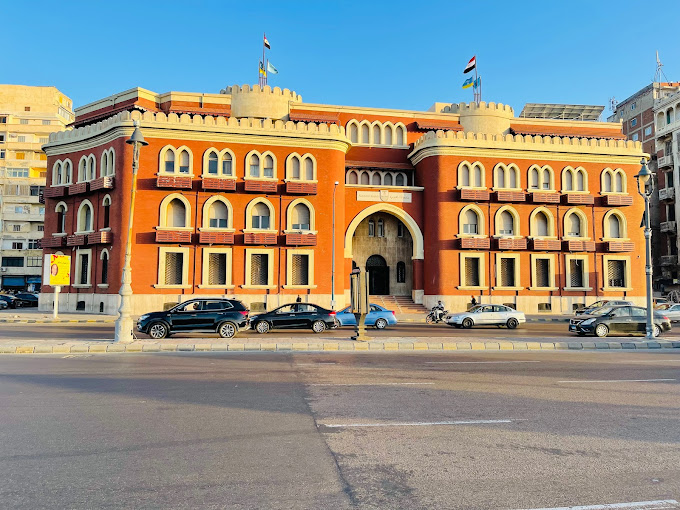
University of Alexandria, a prestigious institution situated in Alexandria, Egypt, stands as a beacon of medical education, research, and healthcare provision in the region. Founded on a rich history of academic excellence and a commitment to advancing medical science, the university has evolved into a hub of innovation, knowledge dissemination, and community service.
The roots of the The Faculty of Medicine - University of Alexandria can be traced back to the early 20th century when medical education in Egypt underwent significant reforms. Alexandria, known for its cultural and intellectual vibrancy, became a focal point for educational development. The university was established to meet the growing demand for qualified healthcare professionals and to elevate the standard of medical care in the country.
The university offers a comprehensive range of undergraduate MBBS programme and postgraduate programs which consist of masters and doctoral degree across various disciplines within the medical and health sciences. These programs encompass medicine, dentistry, pharmacy, nursing, and allied health sciences. The curriculum is designed to provide students with a solid foundation in medical theory, practical skills, and research methodology. Emphasis is placed on evidence-based practice, clinical proficiency, and ethical conduct in healthcare delivery.
The Faculty of Medicine - University of Alexandria boasts a diverse and highly qualified faculty comprising renowned physicians, researchers, and educators. These faculty members are dedicated to nurturing the next generation of healthcare professionals through mentorship, teaching, and research supervision. Their expertise spans a wide spectrum of medical specialties, ensuring comprehensive coverage of the curriculum and fostering interdisciplinary collaboration.
Research is a cornerstone of the university's mission, driving advancements in medical science and healthcare delivery. Faculty members and students engage in cutting-edge research across various disciplines, addressing pressing health challenges and exploring novel therapeutic interventions. The university houses state-of-the-art laboratories, research centers, and collaborative platforms that facilitate interdisciplinary inquiry and knowledge exchange.
Clinical training is an integral component of the medical curriculum, enabling students to apply theoretical knowledge in real-world settings. The university is having 3400 bed modern hospital and have affiliations with leading hospitals, clinics, and healthcare institutions where students receive hands-on training under the guidance of experienced clinicians. These clinical rotations expose students to diverse patient populations, medical conditions, and treatment modalities, fostering clinical competence and professional growth.
The Faculty of Medicine - University of Alexandria is deeply committed to serving the local community and addressing prevalent health disparities. Through outreach programs, health campaigns, and community clinics, the university endeavours to promote health awareness, disease prevention, and access to quality healthcare services. Faculty members and students actively participate in community-based initiatives, providing medical care, education, and support to underserved populations.
The university actively fosters international collaboration and academic exchange to broaden perspectives, enhance global health initiatives, and facilitate cultural exchange. Through partnerships with renowned universities, research institutions, and healthcare organizations worldwide, the university promotes collaborative research projects, student exchange programs, and faculty development initiatives. These collaborations enrich the academic experience, promote cross-cultural understanding, and contribute to global health equity.
Incorporating technology into medical education and healthcare delivery is a priority for the university. From virtual simulation labs to telemedicine platforms, the institution embraces innovative technologies to enhance teaching methodologies, clinical practice, and patient care. Students are exposed to cutting-edge tools and techniques that prepare them for the evolving landscape of modern medicine and healthcare delivery.
Recognizing the importance of lifelong learning and professional development, The Faculty of Medicine - University of Alexandria offers a range of continuing education programs, workshops, and conferences for healthcare professionals. These initiatives provide opportunities for skill enhancement, knowledge acquisition, and networking within the medical community. Through continuing education, practitioners stay abreast of the latest advancements in their respective fields and maintain high standards of clinical practice.
The Faculty of Medicine - University of Alexandria stands as a beacon of excellence in medical education, research, and healthcare provision. With its rich history, commitment to academic rigor, and dedication to societal impact, the university continues to inspire and empower generations of healthcare professionals. Through innovative programs, collaborative partnerships, and a steadfast commitment to excellence, the university remains at the forefront of medical education and research, shaping the future of healthcare in Egypt and beyond.
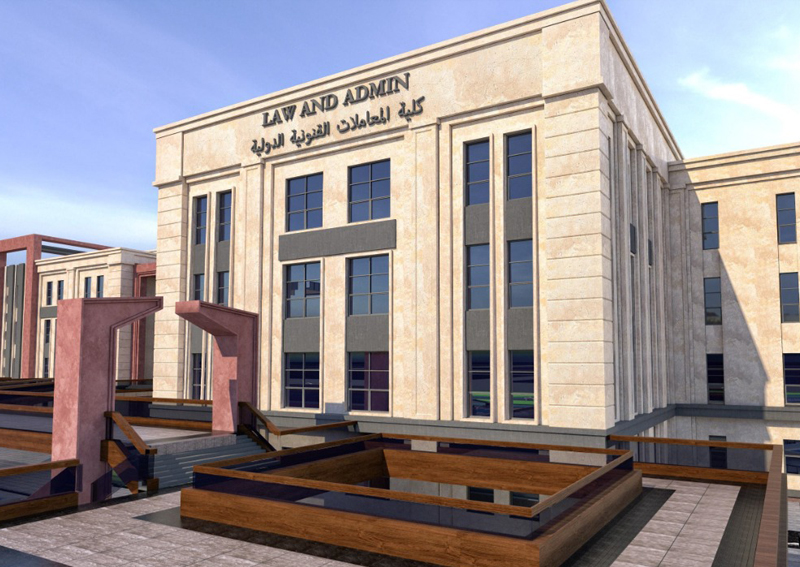
Mansoura University's Faculty of Medicine, located in Mansoura, Egypt, is a beacon of medical education and research in the region. Established with the objective of providing top-notch medical education and producing competent healthcare professionals, it has grown to become one of Egypt's premier medical schools. This faculty is well-known for its rigorous academic curriculum, comprehensive clinical rotations, and a strong emphasis on research and community service. The following sections delve into the various aspects of medical education at Mansoura University's Faculty of Medicine, including its academic courses, clinical rotations, and affiliated hospitals.
The Faculty of Medicine at Mansoura University offers a comprehensive curriculum that covers a wide range of medical sciences and specialties. The curriculum is designed to provide students with a solid foundation in basic medical sciences during the early years of their studies, followed by more specialized clinical training in later years. Courses include, but are not limited to, Human Anatomy and Embryology, Medical Physiology, Medical Biochemistry, Clinical Pharmacology, Medical Microbiology and Immunology, and Anatomic Pathology, among others. These courses are taught through a combination of lectures, laboratory sessions, and small group discussions, fostering an environment of active learning and critical thinking. The faculty offers UG & PG programs, which contains MBBS, Master's degree and Ph.D. degrees in various medical specialties, enhancing its role as a centre for advanced medical education and research.
Clinical rotations form the core of the medical training at Mansoura University's Faculty of Medicine. The university is attached to more than 1500 bed hospitals to its affiliated hospital and clinics. These rotations provide students with hands-on experience in diagnosing and treating patients under the supervision of experienced faculty members and healthcare professionals. Clinical rotations take place in several hospitals and specialized medical centres affiliated with the faculty, such as the Mansoura University Hospital, the Emergency Hospital, the Specialized Medical Hospital, and the Children's Hospital. During these rotations, students gain exposure to a broad spectrum of medical fields, including Surgery, Internal Medicine, Paediatrics, Obstetrics and Gynaecology, and more, allowing them to apply their theoretical knowledge to real-world clinical settings.
The Mansoura-Manchester Medical Program stands out as a hallmark of the faculty's commitment to international standards of medical education. This program, launched in collaboration with the University of Manchester, UK, offers a curriculum that emphasizes problem-based learning, self-directed learning, and research. It aims to produce graduates who are not only skilled clinicians but also lifelong learners and contributors to medical research.
Research is a cornerstone of the academic environment at Mansoura University's Faculty of Medicine. The faculty encourages its students and staff to engage in research activities, contributing to the advancement of medical science. It hosts several research centres and units, such as the Medical Experimental Research Centre and the Oncology Centre, providing resources and support for cutting-edge research in various medical fields.
Mansoura University's Faculty of Medicine stands as a testament to excellence in medical education, research, and community service. Its comprehensive curriculum, extensive clinical rotations, special programs, and emphasis on research and development equip students with the knowledge, skills, and attitudes necessary to become competent and compassionate healthcare professionals. As it continues to evolve and adapt to the changing landscape of medical education and healthcare, the Faculty of Medicine at Mansoura University remains dedicated to its mission of advancing the field of medicine and improving health outcomes for society.

The Faculty of Medicine at Helwan University represents a significant advancement in medical education within Egypt, aiming to prepare a new generation of doctors capable of navigating the complexities of modern healthcare. The institution is dedicated to fostering an environment of academic excellence, research, and clinical proficiency. In the absence of specific details from the university's website due to technical restrictions, this comprehensive overview is crafted based on standard elements found in medical education programs, enriched with insights into what makes Helwan University's approach unique.
Helwan University's Faculty of Medicine is built on a foundation of innovation and commitment to medical education, research, and community service. Its mission encompasses the training of competent, ethical, and compassionate physicians who are prepared to meet both the current and future challenges of the healthcare sector. The faculty aims to contribute significantly to the medical profession through groundbreaking research and by promoting public health and well-being.
The medical program at Helwan University is typically structured into a six-year course leading to a Bachelor of Medicine, Bachelor of Surgery (MBBS) degree. This program is divided into two key phases: the pre-clinical and clinical phases.
The initial years focus on the foundational sciences of medicine, covering anatomy, biochemistry, physiology, microbiology, pathology, pharmacology, and public health. These subjects provide students with the essential knowledge required to understand the human body's normal function and the basis of disease. This phase often includes laboratory work, dissections, and simulations to complement theoretical learning.
The latter years are dedicated to clinical rotations, where students apply their theoretical knowledge in real-world settings across various medical specialties, including but not limited to surgery, internal medicine, paediatrics, obstetrics and gynaecology, psychiatry, and emergency medicine. Clinical rotations are conducted in their own 200 bed hospital, affiliated hospitals and in health centres, offering students a broad exposure to patient care, medical procedures, and the day-to-day operations of healthcare facilities.
A hallmark of Helwan University's Faculty of Medicine is its emphasis on research and innovation. Students are encouraged to engage in research projects, often in collaboration with their professors, in a wide range of medical fields. This focus aims to in still a spirit of inquiry, critical thinking, and a commitment to lifelong learning among students. The faculty supports research through access to state-of-the-art laboratories, research centres, and resources.
The Faculty of Medicine at Helwan University is equipped with modern facilities and resources to support its educational, research, and clinical activities. These include well-equipped laboratories, libraries with extensive medical literature, simulation centres for clinical skills training, and information technology services. Additionally, the faculty's affiliation with hospitals and healthcare centres ensures that students have access to diverse clinical learning environments.
Understanding the global nature of healthcare, Helwan University's Faculty of Medicine strives to provide its students with a global perspective on medical practice and research. This is facilitated through partnerships with international institutions, offering students opportunities for exchange programs, internships, and participation in international conferences and workshops.
The Faculty of Medicine at Helwan University is a testament to Egypt's commitment to advancing medical education, research, and healthcare. Through its comprehensive curriculum, hands-on clinical training, research initiatives, and community service, the faculty prepares its graduates to become leaders in the medical profession. By fostering a culture of excellence, ethical practice, and continuous learning, Helwan University's Faculty of Medicine not only contributes to the health and well-being of its immediate community but also makes a significant impact on the global healthcare landscape.
Aspiring medical students and professionals looking for a dynamic and forward-thinking environment to pursue their medical education would find Helwan University's Faculty of Medicine an excellent choice. With its focus on innovation, research, and community engagement, the faculty is poised to continue its tradition of excellence in medical education and healthcare service.
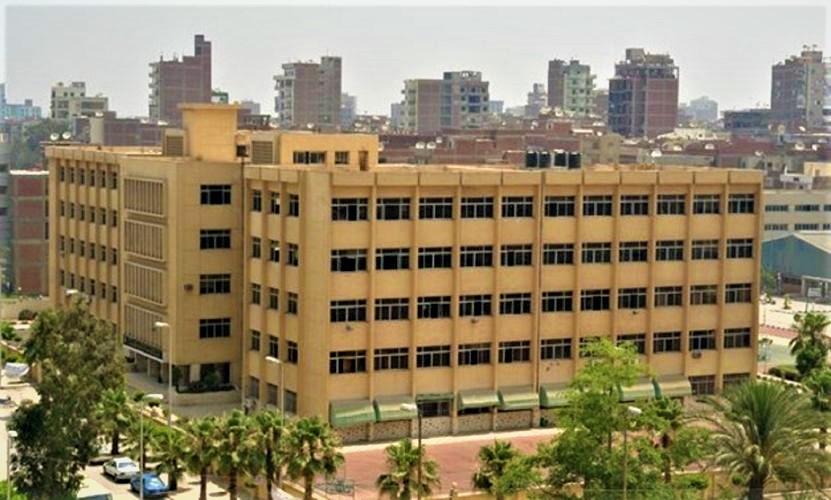
Zagazig University, located in the Sharqia Governorate in Egypt, is home to a Faculty of Medicine that has made significant strides in medical education, research, and patient care. This comprehensive overview delves into the essence of the medical program offered at Zagazig University, illustrating its academic structure, clinical rotations, research opportunities, community engagement, and the broader impact on healthcare in Egypt and beyond.
The Faculty of Medicine at Zagazig University operates with a clear vision: to be a leader in medical education, healthcare services, and research in Egypt and the wider Middle East. Its mission revolves around preparing highly competent and ethical medical professionals committed to lifelong learning, innovation in healthcare, and the well-being of the community. The faculty fosters an environment that encourages critical thinking, research excellence, and a holistic understanding of patient care.
The medical program at Zagazig University spans six years, culminating in the award of a Bachelor of Medicine, Bachelor of Surgery (MBBS) degree. This program is meticulously structured into pre-clinical and clinical phases, designed to build a solid foundation in medical knowledge and skills.
During the initial years, students are immersed in basic medical sciences, including: Anatomy, Physiology, Biochemistry, Pathology, Pharmacology, Microbiology. This phase combines theoretical lectures, practical laboratory sessions, and small group discussions to ensure a comprehensive understanding of the basic sciences underpinning medical practice.
The latter half of the program is dedicated to clinical rotations, where students gain hands-on experience in various medical specialties. Clinical rotations are conducted in Zagazig University's affiliated hospitals and healthcare facilities, offering students exposure to a wide array of clinical settings, patient demographics, and medical conditions.
Research is a cornerstone of the medical program at Zagazig University. Students are encouraged to engage in research activities early in their education, fostering a culture of inquiry and innovation. The faculty supports student research through access to advanced laboratories, mentorship by experienced researchers, and opportunities for collaboration on national and international projects. Areas of research interest include clinical trials, public health studies, and biomedical research, contributing significantly to the advancement of medical science.
Zagazig University boasts state-of-the-art facilities to support its medical program, including modern laboratories, a comprehensive medical library, and simulation centers for clinical skills training. The faculty is affiliated with several hospitals in the Sharqia Governorate, providing a wide range of clinical learning environments. These hospitals are equipped with advanced medical technologies and staffed by experienced healthcare professionals, ensuring that students receive a high-quality clinical education
Recognizing the importance of a global perspective in medical education, Zagazig University's Faculty of Medicine has established partnerships with several international institutions. These collaborations offer students and faculty opportunities for exchange programs, joint research projects, and participation in international conferences. Such initiatives enhance the global outlook of the medical program, preparing graduates to practice medicine in a diverse and interconnected world.
Zagazig University's Faculty of Medicine stands as a testament to excellence in medical education and healthcare in Egypt. Through its comprehensive curriculum, hands-on clinical training, robust research programs, and commitment to community service, the faculty prepares its graduates to become competent, compassionate, and ethical medical professionals. As it continues to evolve and adapt to the rapidly changing landscape of healthcare and medical education, the Faculty of Medicine at Zagazig University remains dedicated to its mission of improving health outcomes and advancing medical knowledge, both locally and globally.
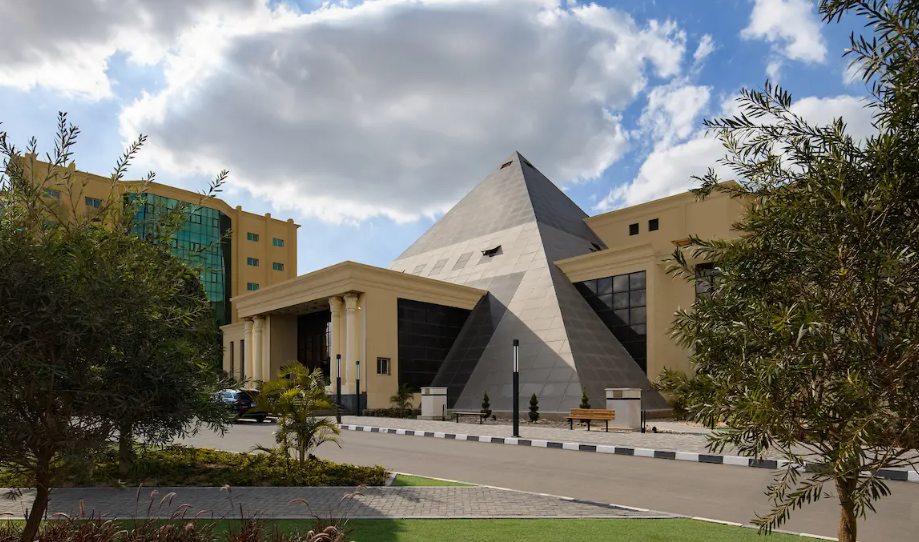
Nahda University in Beni Suef, Egypt, stands out as an institution committed to providing high-quality medical education through its Faculty of Medicine. The university's medical program is designed to equip students with the knowledge, skills, and ethical foundation necessary for a successful career in medicine. This comprehensive overview explores the structure, curriculum, clinical rotations, research opportunities, and unique aspects of the medical program at Nahda University, shedding light on how it prepares future healthcare professionals.
The Faculty of Medicine at Nahda University is driven by a vision to be recognized both nationally and internationally for excellence in medical education, research, and community service. Its mission is to produce competent, ethical, and compassionate physicians who are well-prepared to meet the health needs of communities they serve, contribute to the medical profession, and continue learning throughout their careers. Emphasis is placed on innovation, critical thinking, and the holistic development of student
The medical program at Nahda University follows a standard structure seen in many medical schools, spanning six years and leading to a Bachelor of Medicine, Bachelor of Surgery (MBBS) degree. The program is segmented into pre-clinical and clinical phases, each designed to build upon the knowledge and skills necessary for modern medical practice.
Initial years, students are immersed in basic medical sciences, including: Anatomy, Physiology, Biochemistry, Pathology, Pharmacology, Microbiology. This phase combines theoretical lectures, practical laboratory sessions, and small group discussions to ensure a comprehensive understanding of the basic sciences underpinning medical practice.
The clinical phase introduces students to the practical aspects of medicine, involving rotations in various medical specialties across Nahda University's affiliated hospitals and healthcare facilities. Students gain hands-on experience. These rotations are critical for developing clinical skills, applying theoretical knowledge in real-world settings, and understanding the multidisciplinary approach to patient care.
Nahda University encourages active student participation in research, recognizing its role in advancing medical science and improving patient care. The Faculty of Medicine provides students with opportunities to engage in research projects under the mentorship of experienced faculty members. These projects span various disciplines, contributing to the students' academic growth and the global body of medical knowledge.
Nahda University's Faculty of Medicine is equipped with state-of-the-art facilities, including modern laboratories, a comprehensive medical library, and simulation centers for clinical skills training. These resources, combined with access to affiliated hospitals, ensure that students have a conducive learning environment that supports their academic and professional development.
Understanding the importance of a global perspective in healthcare, Nahda University fosters international collaborations and exchange programs. These initiatives expose students to different healthcare systems, medical practices, and cultures, enriching their educational experience and preparing them for a globalized healthcare environment.
The Faculty of Medicine at Nahda University is dedicated to producing medical graduates who are knowledgeable, skilled, and compassionate. Through its rigorous academic program, hands-on clinical training, research initiatives, and community service, the faculty prepares students to face the challenges of modern healthcare with confidence and integrity. As the faculty continues to grow and evolve, its commitment to excellence in medical education, research, and service remains steadfast, contributing significantly to the advancement of healthcare in Egypt and beyond.
Prospective students and stakeholders in the medical field would find Nahda University's Faculty of Medicine an exemplary institution, characterized by its commitment to fostering a comprehensive and humane approach to medical education.
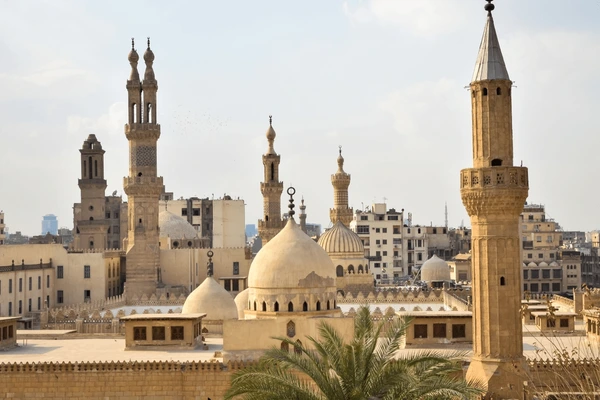
Al-Azhar University in Egypt holds a prestigious position in the realm of Islamic education, but its influence extends far beyond theology. One of its notable facets is the medical program, which blends modern medical education with a deep-rooted respect for Islamic principles. Let's delve into the rich tapestry of Al-Azhar's medical program and the clinical experience it offers to its students.
Founded in 970 AD, Al-Azhar University stands as one of the oldest and most renowned educational institutions in the world. Originally established as a center for Islamic learning, it has evolved over centuries to encompass various disciplines, including medicine. Al-Azhar's medical program is a testament to its commitment to academic excellence and the integration of religious and scientific knowledge.
The medical program at Al-Azhar University follows a comprehensive curriculum that covers all aspects of modern medicine while also incorporating Islamic teachings and ethics. Students undergo rigorous training in basic sciences, clinical skills, and patient care, all under the guidance of experienced faculty members.
One distinctive feature of Al-Azhar's medical program is its emphasis on holistic healthcare. In addition to treating physical ailments, students are taught to consider the spiritual and emotional well-being of patients, in accordance with Islamic principles of compassion and empathy. This holistic approach is woven into every aspect of the curriculum, from lectures on medical ethics to practical training in patient interaction.
Clinical experience is a cornerstone of medical education at Al-Azhar University. Students have access to state-of-the-art medical facilities, including hospitals and clinics affiliated with the university. Under the supervision of skilled physicians, they engage in hands-on learning experiences that prepare them for the challenges of real-world medical practice.
During their clinical rotations, students rotate through various specialties, including internal medicine, surgery, pediatrics, obstetrics and gynecology, and more. This exposure to different areas of medicine allows students to develop a well-rounded understanding of healthcare and discover their interests and strengths.
One of the unique aspects of clinical training at Al-Azhar is the integration of Islamic ethics into patient care. Students learn to respect patients' religious beliefs and cultural practices while providing compassionate and culturally sensitive care. This aspect of training is particularly valuable in a diverse and multicultural society like Egypt, where patients come from various backgrounds and faith traditions.
In addition to traditional clinical settings, Al-Azhar University offers students opportunities for community-based healthcare and outreach programs. These initiatives allow students to apply their medical knowledge and skills in underserved areas, where access to healthcare may be limited. By serving the community, students not only gain valuable clinical experience but also develop a sense of social responsibility and empathy for those in need.
Al-Azhar's medical program also emphasizes research and innovation in healthcare. Students are encouraged to participate in research projects that address pressing health issues facing society. Whether investigating the prevalence of chronic diseases or exploring new treatment modalities, students have the opportunity to contribute to the advancement of medical science while honing their critical thinking and analytical skills.
Throughout their medical education journey, students at Al-Azhar University benefit from a supportive and nurturing learning environment. Faculty members are not only experts in their respective fields but also mentors who guide and inspire students to reach their full potential. This close mentorship fosters a sense of camaraderie and collaboration among students, creating a vibrant academic community.
Al-Azhar University's medical program offers a unique blend of modern medical education and Islamic values. Through a comprehensive curriculum, hands-on clinical experience, and a commitment to compassionate patient care, students are equipped with the knowledge, skills, and ethical principles needed to excel as healthcare professionals. As they embark on their careers, graduates of Al-Azhar's medical program carry with them not only the prestige of their alma mater but also a deep sense of purpose and service to humanity.